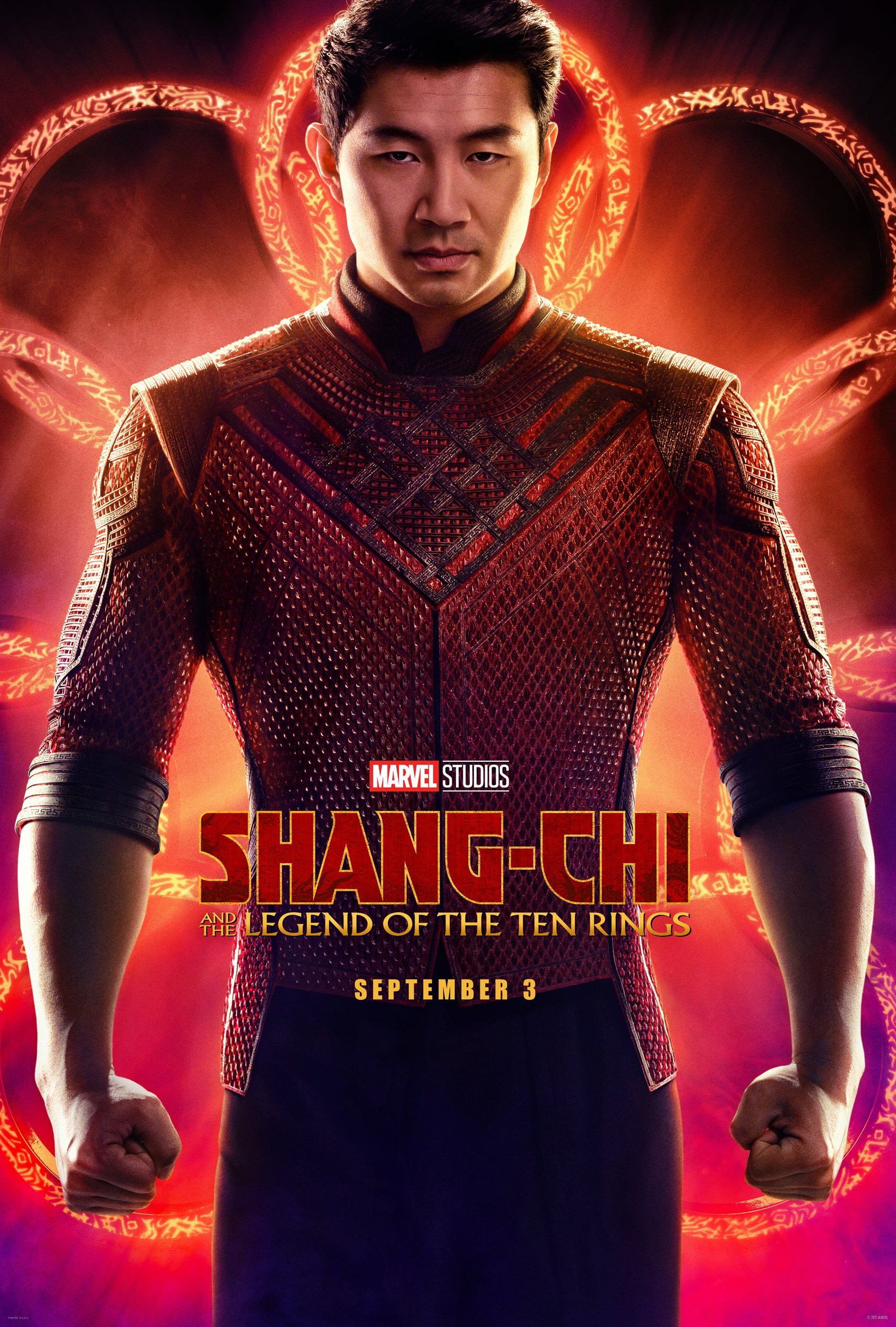
23 Aug Shang-Chi and the Legend of the Ten Rings Review
SHANG-CHI AND THE LEGEND OF THE TEN RINGS
dir. Destin Daniel Cretton, starring Simu Liu, Tony Leung, Awkwafina, Fala Chen, and Michelle Yeoh
In 2018, the Marvel Cinematic Universe opened its doors to telling stories centered on people of color, providing the audiences with the rich, lush history of Wakanda and the Wakandan peoples. I wouldn’t go so far as to call it a cultural revolution, but the impact Black Panther had on the moviegoing audience is undeniable. Since then, the MCU has released two female centered films in Captain Marvel and Black Widow and now we’ve arrived at Shang-Chi and the Legend of the Ten Rings, the first superhero movie to focus on characters of Chinese heritage. With this unveiling of a new corner of the connected universe comes new threats, new wonders, and new heroes to root for. Shang-Chi, originally appearing in Marvel Comics’ Master of Kung Fu in the 1970s, now has an updated origin story for the modern times and a cast to reflect contemporary sensibilities.
Opening with a fight scene that has an almost dream-like, ethereal storybook quality, the movie is packed with tons of action, heart, and humor. The father and son theme that is always so prevalent in the MCU is once again on full display here, this time coupled with a theme of legacies and living up to one’s potential. Both Shang-Chi and his friend Katy are at peace with their low key lives as valets while both have parental figures who want more from them. In Shang-Chi’s case, his father Wenwu wants him to eventually take his side as master of the Ten Rings, a multinational crime syndicate (a Rainbow Coalition of crime). That, paired with Wenwu’s notion that this departed wife, Shang-Chi’s mother, is still alive and being held captive in a mystical city, are the heart of the film, complete with great worldbuilding, awesome fight scenes, and amazing visuals.
With Black Widow and now Shang-Chi and the Legend of the Ten Rings, Phase Four of the MCU continues with the relative low stakes that comes after the insurmountable high of Avengers: Endgame. In Shang-Chi, a single village is at peril as Wenwu will stop at nothing to save his wife. Accompanying Wenwu are the ten rings, ten mystical arm bands that imbue the wearer with superhuman abilities. If you’re one for explanations, you won’t find any here as the rings are never fully explored beyond looking cool and being used to kick ass. One of the positives of the film is the fact that questions are left to be answered in the inevtiable sequel. Speaking of sequels, both end credits set up to help fully integrate the characters into the wider scope of the MCU while also serving as a platform for a continuation of Shang-Chi and sister Xialing’s personal stories.
While thoroughly entertaining, the film isn’t without faults. As is the seemingly the norm for superhero movies, Shang-Chi and the Legend of the Ten Rings’ third act devolves into a CGI fest that at times is hard to follow visually. Without risking spoilers, the final battle, a mixture of natural and mystical elements, is choppy and confusing. It doesn’t quite reach the levels of Wonder Woman bad, but there was potential for a more emotionally satisfying climax that was somewhat glossed over in favor of what we got. Also, from a comics perspective, the choice to include a location that draws heavy parallels to Kun-Lun (mystical city; multiple characters dressed in green and yellow, traditional Iron Fist colors; talk of the heart of a dragon) yet not outright include Iron Fist lore is a baffling one.
Starring Simu Liu, Shang-Chi and the Legends of the Ten Rings put the Chinese actor first and foremost, giving Liu the opportunity to display his talents. As a member of the ensemble cast of sitcom Kim’s Convenience, Liu shares the screen with a number of actors and actresses, but here as the leading man he’s given the spotlight to shine. Liu’s easygoing charm and affable nature will quickly win over audiences and endear them to the character. Liu’s dramatic chops are on display as well as Shang-Chi spends the film clashing with both his sister and his father’s way of life. Liu’s Shang-Chi is here to stay in the MCU and after seeing his performance in his first outing, Marvel Studios has proven yet again one of their biggest talents lies in their ability to cast the right person for the right role. As such, Hong Kong born actor Tony Leung’s first major introduction to western audiences as Wenwu finally gives Americans a chance to see one of the best living actors on display. Liu’s style of quiet, pensive, deliberately nuanced acting isn’t a major focus in Shang-Chi; the character of Wenwu is just a few steps above a Phase One villain. Similarly, Ray Winstone’s Dreykov in Black Widow (while severely less developed than Wenwu), also has the feel of a Phase One villain which feeds into the idea of the MCU wiping the slate clean and resetting expectations back to their beginnings. Still, Leung is a joy to watch whenever he’s on screen and his chemistry when paired with Liu makes for strong material.
Awkwafina as Katy continues her trend of seemingly being Awkwafina in every role she’s cast in. From Ocean’s Eight to Crazy Rich Asians to Shang-Chi, her ebullient line delivery and acting style is at this point either well-worn or a comfortable blanket, depending on the penchant of the viewer. Katy’s chemistry with Shang-Chi is undeniable, however, as the pair make for possibly the best on screen cinematic coupling since Steve Rogers and Peggy Carter. The brilliance of this pairing lies not in a good romantic subplot, but two incredibly close friends, ready to help each other out in any circumstance. If Jimmy Woo and Darcy are our Mulder and Scully of the MCU, Shang-Chi and Katy are Harry and Heromoine, ready for wacky adventures at a moment’s notice while being comfortable with the nature of their relationship. One of the standouts of the film is Meng’er Zhang as Xialing, Shang-Chi’s estranged sister. Zhang manages to command the screen with something akin to pent up rage and frustration as Xialing is determined to make her own legacy in the world. Zhang’s growth and progression as a friend-or-foe foil for Shang-Chi is a delight to watch thanks to strong writing for the character and strong acting from Zhang.
Directed by Destin Daniel Cretton, Shang-Chi is a busy movie. Audiences are introduced to not just a new hero in the MCU, but an entirely new world, something not seen since 2018. Intercutting between events of past and present, this is the first of the Marvel films to rely heavily on flashbacks to establish relationships between characters. The non linear storytelling works thanks largely in part to certain reveals that awards previously withheld information from the audience. Unfortunately, while trying to keep the storytelling fresh by bouncing from past to present, the second act still feels sluggish due to heavy expositions from Wenwu and Jian Nan. Both carry a hefty bit of dialogue as they explain to Shang-Chi (and us) what’s happened before in order to lay seeds of what’s to come in the third act. The third act and the pathway to the inevitable confrontation between Shang-Chi and Wenwu still manages to surprise and subvert the common martial arts expectations in a way that feel somewhat satisfying, if not a bit surprising. Cinematographer Bill Pope (The Matrix trilogy, Scott Pilgrim vs the World) continues to dazzle with brilliant shots that, combined with great production design, manage to capture and celebrate the Chinese culture in a way that doesn’t feel cliché or lazy. Cretton and Pope manage to pay homage to a number of films via the cinematography that includes both Kill Bill volume 1 and Skyfall.
Of all the questions surrounding Shang-Chi prior to its release, going all the way back to its 2019 San Diego ComiCon announcement, the biggest area of concern was centered on the authenticity of the fight scenes. Fans of previous Marvel-related works (looking directly at you, Iron Fist) have been burnt in the past when it comes to well staged fight choreography. Thankfully that’s not the case here, as the fight scenes are well crafted and tailored to fit the needs of each scene. Multiple styles of fighting are present, from the graceful, flowing wushu style as seen employed by Shang-Chi’s mother and aunt to the more frantic, kinetic Jackie Chan-inspired style of improvised fighting Shang-Chi uses during the bus scene. Each style is well suited for the situation at hand and goes a long way to establishing the fact that there as many different styles of hand-to-hand combat as there are different Asian cultures. At no point do the fights seem lazy or unrehearsed; if there’s one thing stunt coordinator Brad Allan was keen to do, it was to not repeat the mistakes of previous ventures into the genre.
Overall, Shang-Chi is another feather in the cap of Marvel Studios. Finally embracing a multicultural aspect to their storytelling and recognizing that superheroes come from more places than just America, they’ve allowed themselves to fully open to a world of possibilities where stories steeped in any heritage can originate. A great leading performance from Simu Liu, a solid core cast, and a strongly directed film make Shang-Chi a worthy addition to Phase Four of the MCU. How it connects to the overall tapestry woven into the interconnected universe still remains to be seen, but with two stellar end credits sequences, hopes are high that our titular hero will return for more adventures with Katy in tow. Shang-Chi and the Legend of the Ten Rings is in theaters September 3rd.
Review by Darryl Mansel


No Comments